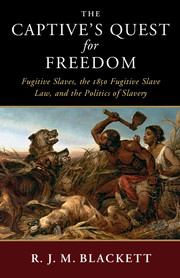 The Captive's Quest for Freedom
The Captive's Quest for Freedom 1 - The Fugitive Slave Law
from PART I - THE SLAVE POWER ASSERTS ITS RIGHTS
Published online by Cambridge University Press: 19 January 2018
Summary
When twenty-three-year-old Peter Green left Newport, Giles County, Virginia, in early September 1850, his plan was to get to Richmond and from there to a Free State. He got only as far as Lynchburg, roughly one hundred miles from his home, when he was intercepted at the Franklin Hotel as he tried to buy a train ticket. When questioned, Green claimed he was a free man going on a visit to Pennsylvania. But it quickly became apparent that his free papers, which he readily produced, were forged. Those who took him into custody found that he was also carrying an atlas, pen, ink and paper – which possibly could be used to forge additional passes as needed – and on which was carefully recorded the mileage between Newport and Richmond. A few weeks earlier, a group of eight slaves from Clarke County, in the Shenandoah Valley of Virginia, had arrived in Harrisburg, Pennsylvania. Three of them, Samuel Wilson, George Brocks, and Billy, decided to try their luck in the city, unaware that their masters were hot on their heels. From Chillicothe, Ohio, came word that more than 110 slaves had passed through the town from Kentucky in the six months before October 1850. One slave catcher told a not-too-sympathetic correspondent that, over the spring and summer of 1850, Maryland and Virginia had lost more slaves than in “any former period.” Among them must have been the seven who together fled Maryland in August 1850, five of whom were captured in Shrewsbury, Pennsylvania, one mile above the Maryland line, as well as the ten Virginia slaves who got lost in the Allegheny Mountains and were captured in Bedford, Pennsylvania. These were just a few examples of what, to many Southerners, was a disturbing pattern of slave escapes.
A few of these escapes were nothing if not spectacular. William and Ellen Craft had escaped from Macon, Georgia, over the 1848 Christmas holidays. Phenotypically white, Ellen dressed as a master traveling to Philadelphia for medical treatment; William accompanied her as her slave. Traveling openly by train and boat, they made it to Pennsylvania in just four days. Three months later, Henry Brown came up with the ingenious scheme to have himself crated and mailed to Philadelphia. Hours later he emerged triumphantly from his box at the offices of the American Antislavery Society, if a little worse for wear.
- Type
- Chapter
- Information
- The Captive's Quest for FreedomFugitive Slaves, the 1850 Fugitive Slave Law, and the Politics of Slavery, pp. 3 - 41Publisher: Cambridge University PressPrint publication year: 2018


